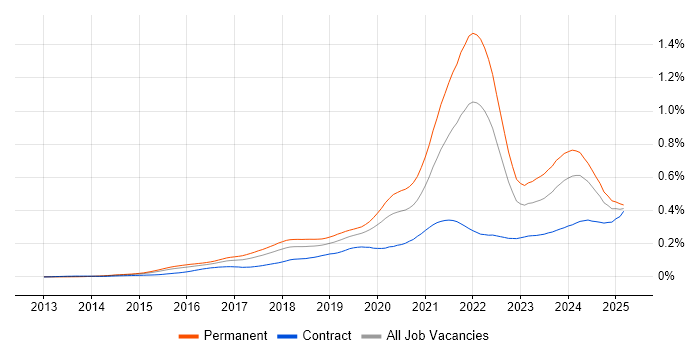Full-Stack Engineer
UK
The median Full-Stack Engineer salary in the UK is £70,000 per year, according to job vacancies posted during the 6 months leading to 30 April 2025.
The table below provides salary benchmarking and summary statistics, comparing them to the same period in the previous two years.
| 6 months to 30 Apr 2025 |
Same period 2024 | Same period 2023 | |
|---|---|---|---|
| Rank | 470 | 329 | 485 |
| Rank change year-on-year | -141 | +156 | -233 |
| Permanent jobs requiring a Full-Stack Engineer | 219 | 851 | 623 |
| As % of all permanent jobs advertised in the UK | 0.42% | 0.87% | 0.60% |
| As % of the Job Titles category | 0.47% | 0.91% | 0.65% |
| Number of salaries quoted | 185 | 346 | 332 |
| 10th Percentile | £45,250 | £43,750 | £52,500 |
| 25th Percentile | £57,500 | £52,500 | £60,000 |
| Median annual salary (50th Percentile) | £70,000 | £65,000 | £80,000 |
| Median % change year-on-year | +7.69% | -18.75% | +3.23% |
| 75th Percentile | £85,253 | £92,500 | £100,000 |
| 90th Percentile | £117,500 | £115,000 | £120,000 |
| UK excluding London median annual salary | £60,000 | £60,000 | £65,000 |
| % change year-on-year | - | -7.69% | +6.12% |
All Permanent IT Job Vacancies
UK
For comparison with the information above, the following table provides summary statistics for all permanent IT job vacancies. Most job vacancies include a discernible job title that can be normalized. As such, the figures in the second row provide an indication of the number of permanent jobs in our overall sample.
| Permanent vacancies in the UK with a recognized job title | 46,971 | 93,051 | 95,196 |
| % of permanent jobs with a recognized job title | 90.06% | 94.62% | 91.53% |
| Number of salaries quoted | 27,308 | 66,827 | 59,871 |
| 10th Percentile | £30,000 | £28,500 | £32,500 |
| 25th Percentile | £42,500 | £38,500 | £45,000 |
| Median annual salary (50th Percentile) | £57,500 | £52,750 | £60,000 |
| Median % change year-on-year | +9.00% | -12.08% | - |
| 75th Percentile | £75,000 | £71,250 | £81,250 |
| 90th Percentile | £97,500 | £90,000 | £100,000 |
| UK excluding London median annual salary | £52,344 | £50,000 | £52,500 |
| % change year-on-year | +4.69% | -4.76% | +5.00% |
Full-Stack Engineer
Job Vacancy Trend
Job postings that featured Full-Stack Engineer in the job title as a proportion of all IT jobs advertised.

Full-Stack Engineer
Salary Trend
3-month moving average salary quoted in jobs citing Full-Stack Engineer.
Full-Stack Engineer
Salary Histogram
Salary distribution for jobs citing Full-Stack Engineer over the 6 months to 30 April 2025.
Full-Stack Engineer
Top 15 Job Locations
The table below looks at the demand and provides a guide to the median salaries quoted in IT jobs citing Full-Stack Engineer within the UK over the 6 months to 30 April 2025. The 'Rank Change' column provides an indication of the change in demand within each location based on the same 6 month period last year.
| Location | Rank Change on Same Period Last Year |
Matching Permanent IT Job Ads |
Median Salary Past 6 Months |
Median Salary % Change on Same Period Last Year |
Live Jobs |
|---|---|---|---|---|---|
| England | -24 | 206 | £70,000 | - | 300 |
| London | +51 | 113 | £75,000 | -16.67% | 189 |
| UK excluding London | -168 | 98 | £60,000 | - | 125 |
| Work from Home | +132 | 93 | £70,000 | +8.11% | 211 |
| North of England | +14 | 32 | £57,500 | -4.17% | 49 |
| South West | +111 | 21 | £60,000 | +20.00% | 14 |
| South East | +57 | 21 | £65,000 | +8.33% | 23 |
| North West | -36 | 19 | £60,000 | - | 32 |
| Yorkshire | +75 | 13 | £50,000 | +11.11% | 14 |
| Midlands | -12 | 12 | £52,500 | -10.26% | 14 |
| West Midlands | +49 | 11 | £52,500 | -12.50% | 5 |
| East of England | +49 | 5 | £60,000 | -4.00% | 13 |
| Scotland | -71 | 5 | £79,569 | +22.41% | 6 |
| Wales | +28 | 2 | £80,000 | +33.33% | 5 |
| East Midlands | -21 | 1 | - | - | 9 |
Full-Stack Engineer Skill Set
Top 30 Co-occurring Skills and Capabilities
For the 6 months to 30 April 2025, Full-Stack Engineer job roles required the following skills and capabilities in order of popularity. The figures indicate the absolute number co-occurrences and as a proportion of all permanent job ads featuring Full-Stack Engineer in the job title.
|
|
Full-Stack Engineer Skill Set
Co-occurring Skills and Capabilities by Category
The follow tables expand on the table above by listing co-occurrences grouped by category. The same employment type, locality and period is covered with up to 20 co-occurrences shown in each of the following categories:
|
|
|||||||||||||||||||||||||||||||||||||||||||||||||||||||||||||||||||||||||||||||||||||||||||||||||||||||||||||||||||||||||||
|
|
|||||||||||||||||||||||||||||||||||||||||||||||||||||||||||||||||||||||||||||||||||||||||||||||||||||||||||||||||||||||||||
|
|
|||||||||||||||||||||||||||||||||||||||||||||||||||||||||||||||||||||||||||||||||||||||||||||||||||||||||||||||||||||||||||
|
|
|||||||||||||||||||||||||||||||||||||||||||||||||||||||||||||||||||||||||||||||||||||||||||||||||||||||||||||||||||||||||||
|
|
|||||||||||||||||||||||||||||||||||||||||||||||||||||||||||||||||||||||||||||||||||||||||||||||||||||||||||||||||||||||||||
|
|
|||||||||||||||||||||||||||||||||||||||||||||||||||||||||||||||||||||||||||||||||||||||||||||||||||||||||||||||||||||||||||
|
|
|||||||||||||||||||||||||||||||||||||||||||||||||||||||||||||||||||||||||||||||||||||||||||||||||||||||||||||||||||||||||||
|
|
|||||||||||||||||||||||||||||||||||||||||||||||||||||||||||||||||||||||||||||||||||||||||||||||||||||||||||||||||||||||||||
|
||||||||||||||||||||||||||||||||||||||||||||||||||||||||||||||||||||||||||||||||||||||||||||||||||||||||||||||||||||||||||||
